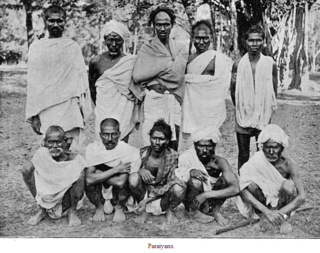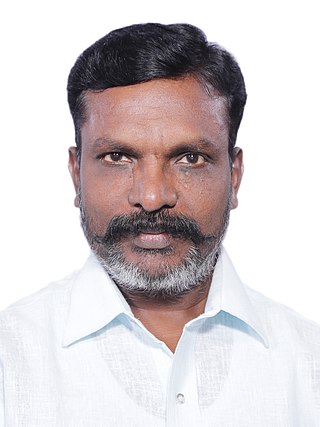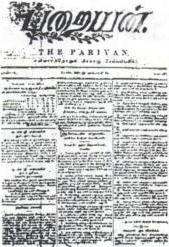Adi Dravida is a term that has been used since 1914 by the state of Karnataka and Tamil Nadu in India to denote Paraiyars. At the time of the 2011 Census of India, they made up about half of Karnataka and Tamil Nadu's Scheduled Caste population.

Dalit, also some of them previously known as untouchables, is the lowest stratum of the castes in the Indian subcontinent. Dalits were excluded from the four-fold varna of the caste hierarchy and were seen as forming a fifth varna, also known by the name of Panchama. Several scholars have drawn parallels between Dalits and the Burakumin of Japan, the Baekjeong of Korea, the Hukou system of China and the peasant class of the medieval European Feudal system.

Paraiyar, or Parayar or Maraiyar, is a caste group found in the Indian states of Tamil Nadu and Kerala and in Sri Lanka.
Anti-Brahminism is a term used in opposition to caste-based hierarchical social order which places Brahmins at its highest position. Initial expressions of Anti-Brahminism emerged from instances of pre-colonial opposition to the caste system in India, ideological influences during the colonial period, and from a colonialist Protestant Christian understanding of religion in the 19th century, which viewed "Brahminism" as a corrupted religion imposed on the Indian population. Reformist Hindus, and also Ambedkar, structured their criticism along similar lines following the 19th century criticism of "Brahminism," opposing the dominant position Brahmins had acquired by the time of British rule in the 19th century.

Paramasivan Subbarayan was an Indian politician, freedom fighter and diplomat and was the Chief Minister of Madras Presidency, India's ambassador to Indonesia and Union Minister of Transport and Communications in Jawaharlal Nehru's government. He was the father of General P. P. Kumaramangalam, who served as India's Chief of Army staff, and of politician Mohan Kumaramangalam. He was also the grandfather of INC and BJP politician and Union Minister Rangarajan Kumaramangalam.

Viduthalai Chiruthaigal Katchi formerly known as the Dalit Panthers of India or the Dalit Panthers Iyyakkam is an Indian social movement and political party that seeks to combat caste based discrimination, active in the state of Tamil Nadu. The party also has a strong emphasis on Tamil nationalism. Its chairman is Thol. Thirumavalavan, a lawyer from Chennai and its general secretary is the writer Ravikumar.
Valluvar is a sub-caste belonging to the Paraiyar community in the Indian state of Tamil Nadu. They are the hereditary priests of the Pallars and Paraiyars of Tamil Nadu.

Tholkappiyan Thirumavalavan, better known as Thol. Thirumavalavan is a political leader, scholar and activist from the southern Indian state of Tamil Nadu. He is a Member of Parliament from Chidambaram. Founder and President of Viduthalai Chiruthaigal Katchi. He rose to prominence in the 1990s as a Dalit leader, and formally entered politics in 1999. His political platform centres on ending caste-based discrimination and consequently the caste system. He has also expressed support for Tamil nationalist movements in Sri Lanka.

Erode Venkatappa Ramasamy, revered by his followers as Periyar or Thanthai Periyar, was an Indian social activist and politician who started the Self-Respect Movement and Dravidar Kazhagam. He is known as the 'Father of the Dravidian movement'. He rebelled against Brahmin dominance and gender and caste inequality in Tamil Nadu. Since 2021, the Indian state of Tamil Nadu celebrates his birth anniversary as 'Social Justice Day'.
C. Iyothee Thass was an Indian anti-caste activist and a practitioner of Siddha medicine. He famously converted to Buddhism and called upon the Paraiyars to do the same, arguing that this was their original religion. He also founded the Panchamar Mahajana Sabha in 1891 along with Rettamalai Srinivasan. Panchamas are the ones who are outcastes.

P. Kakkan or fondly known as Kakkan, was an Indian politician and freedom fighter who served as a member of the Constituent Assembly of India, Member of Parliament, President of the Tamil Nadu Congress Committee and in various ministerial posts in Congress governments in the erstwhile Madras state between 1957 and 1967.
Mylai Chinna Thambi Pillai Rajah was an Indian politician, educationist, social and political activist from the Indian state of Tamil Nadu.

Ilavenil Meena Kandasamy is an Indian poet, fiction writer, translator and activist from Chennai, Tamil Nadu, India.

A. Vaidyanatha Iyer, also known as Madurai Vaidyanatha Iyer or Ayyar was an Indian activist, politician and freedom-fighter who spearheaded the temple entry movement in Madras Presidency in 1939.

Rao Bahadur Namasivayam Sivaraj was an Indian lawyer, politician and Scheduled Caste activist from the state of Tamil Nadu.

Balasubramanian Parameswaran was an Indian politician and former Member of the Legislative Assembly of Tamil Nadu. He was elected to the Tamil Nadu legislative assembly from Maduranthakam constituency as an Indian National Congress candidate in 1946, 1952, and 1962 elections. He was the grandson of Rettamalai Srinivasan, a pioneer in the Scheduled Caste movement. He was educated at the St. Gabriels High School and Presidency College, Madras. He served as private secretary to another Scheduled Caste leader M. C. Rajah. During 7 April 1949 – 9 April 1952, he was the minister for Firka development, Khadi, Cottage industries, Fisheries, Cinchona and Harijan uplift in the P. S. Kumaraswamy Raja cabinet. During 1952–54, he was the mayor of Madras. From 13 April 1954 until 31 March 1957, he was the minister for Transport, Harijan Uplift, Hindu Religious Endowments, Registration and Prohibition in K. Kamaraj's first cabinet. During 1958–62, he was a member of the Rajya Sabha – the upper house of the Indian parliament.

Holeya are a scheduled caste of India, mainly belonging to present day Karnataka State, Kerala, Maharashtra, Tamil Nadu and also Madhya Pradesh.
Poondi estate is a permanently settled zamindari estate in the Thanjavur district of Tamil Nadu, India. It is administered by the Vandayar family of the kallar caste.
The 2004 Kalapatti violence refers to the violence against Dalits by dominant-caste villagers in the village of Kalapatti, Tamil Nadu on 16 May 2004. About 100 Dalit houses have been burned down by a mob of 200 villagers and Dalits who attempted to escape were attacked. The attacks lasted for 2 hours and 14 people were seriously injured in the violence including a man's arm reportedly hacked off.
The 2019 Ponparappi violence happened on April 18, 2019, during the polling day for the 2019 Indian general election in the village of Ponparappi, Tamil Nadu. The violence reportedly started as scuffles and agitations between the supporters of Viduthalai Chiruthaigal Katchi (VCK) and the members of Pattali Makkal Katchi (PMK) together with the members of Hindu Munnani, which reportedly led to violence by the members of the PMK on a Dalit colony. 60 to115 Dalit houses were damaged and Dalits were assaulted.














